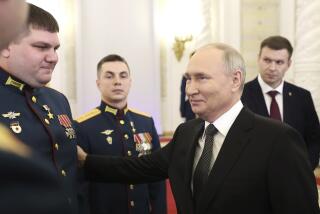Uzbek President Seeks to Again Extend His Term
- Share via
MOSCOW — Uzbek President Islam Karimov, one of America’s strategic Central Asian partners in the war against terrorism, plans to extend his term to 2007 by referendum.
Karimov, who was Uzbekistan’s Communist-era leader and retained power after the Soviet Union collapsed in 1991, has been criticized frequently by international watchdog groups for his government’s poor record on democracy and human rights.
Despite these concerns, the U.S. and Uzbekistan have forged a close military partnership in recent years. Karimov cemented those ties by becoming the first Central Asian leader to give the U.S. military access to facilities for the war in Afghanistan.
Organizations such as New York-based Human Rights Watch are alarmed that Uzbekistan’s military cooperation may lead the United States to overlook the electoral abuses, torture and false imprisonment that the group says have been routine under Karimov.
The referendum is to be held next month. It will mark the second time Karimov has used the tactic to extend his rule. The first was in 1995, when he extended his term to 2000. Last year he was elected to another five-year term.
“In Uzbekistan’s current political conditions, there is no possibility for any free or fair vote or for an informed choice to be made at the ballot box,” Rachel Denber of Human Rights Watch’s New York office said Thursday.
“When Karimov was reelected in 2000, there were no genuine opposition parties,” she said. “The media are heavily censored.”
As with previous balloting in Uzbekistan, last year’s vote was widely criticized for electoral violations. The sole opposition candidate announced that he would vote for Karimov.
Using referendums to extend presidential terms became common among the more authoritarian of the ex-Soviet leaders in the mid-1990s: Alexander G. Lukashenko of Belarus was strongly criticized by the U.S. when he used the tactic in 1996.
Although the State Department has been consistent in its condemnation of Lukashenko for his authoritarian leadership, U.S. criticism of Karimov’s rule has been less strident. Belarus lacks the strategic importance of Uzbekistan.
Other leaders who have extended their terms by referendum include Presidents Nursultan A. Nazarbayev of Kazakhstan, Emamali Rakhmonov of Tajikistan and Saparmurad A. Niyazov of Turkmenistan. Niyazov declared himself president for life in 1999 then announced this year that he might retire in 2010.
Karimov calls his nation of 24 million people a “democracy, Uzbek style.” Critics note that there are no genuine opposition parties, no free and fair elections, and more than 7,000 political or religious prisoners in Uzbek jails.
Karimov’s move to extend his rule comes as authorities here seek the extradition from the Czech Republic of Mukhammat Salikh, the last strong opposition figure to challenge Karimov in an election. Salikh ran against the president a decade ago.
Salikh, who was granted political asylum in Norway two years ago, was detained Nov. 28 at the airport in Prague, the Czech capital, on an international arrest warrant. The Karimov government accuses him of being an Islamic militant. Supporters say that the charges are politically motivated and that Salikh’s life would be in danger if he were returned to Uzbekistan.
A recent Human Rights Watch background paper on Uzbekistan says authorities harassed, jailed and beat local human rights activists, one of whom died in custody in July as a result of torture.
“Torture is systemic in Uzbekistan,” the report says. “Police torture has resulted in at least 15 deaths in custody in the past two years alone.”
Karimov’s government closed 900 mosques and required religious organizations to register. The Human Rights Watch report says that more than 7,000 Muslims were jailed, including many peaceful citizens who have been forced to practice their faith in secret.
“In a throwback to the darkest days of the Soviet Union, local authorities regularly organize public hate rallies to mobilize community pressure against and to intimidate detainees’ families,” the paper says.
Karimov justifies his crackdown on Islam, saying his targets are extremists and warning that the country faces the threat of a fundamentalist Taliban-style rebellion.
Denber said it is too early to judge whether the Bush administration has shelved human rights concerns to appease Karimov and retain Uzbekistan’s military cooperation. Much will depend on the approach taken by Secretary of State Colin L. Powell, who is due to visit the region in coming days.
The U.S. “is not doing as much as it could do,” Denber said. “The biggest lost opportunity was in October, when the Bush administration did not name Uzbekistan as a country of concern on religious freedom when it had every reason to do so. That was clearly for political reasons.”
More to Read
Sign up for Essential California
The most important California stories and recommendations in your inbox every morning.
You may occasionally receive promotional content from the Los Angeles Times.













